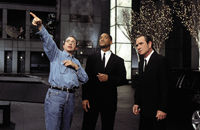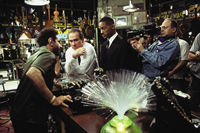Space Invader: MIIB's Barry Sonnenfeld
When he agreed to direct a sequel to his megahit Men In Black, Barry Sonnenfeld was determined not to repeat himself. "We had to bring back Will Smith and Tommy Lee Jones, because so much of what made that first movie work was the relationship between them," he explains. "They're like Abbott and Costello. You can't have one without the other . . . there's a karmic thing between these two. The audience likes to see them bicker. The first movie takes place over three days and MIIB over two, so they only know each other for five days—but it looks like they've been together for 30 years!"
 In MIIB, J and K's rapport undergoes a sea change. "The role reversal that casts my character, Agent J, as the hardened veteran, and Agent K as the rookie," says Will Smith, "is classic comedy. This harks back to Aristotle: Contrast creates conflict, which creates comedy. You are not going to see two more different people on the screen than Tommy and myself. We incorporated some of our real-life differences into our characters. It's wonderful food for comedy."
In MIIB, J and K's rapport undergoes a sea change. "The role reversal that casts my character, Agent J, as the hardened veteran, and Agent K as the rookie," says Will Smith, "is classic comedy. This harks back to Aristotle: Contrast creates conflict, which creates comedy. You are not going to see two more different people on the screen than Tommy and myself. We incorporated some of our real-life differences into our characters. It's wonderful food for comedy."
While Smith, who had to start filming immediately after wrapping his Academy Award-nominated lead role in Ali, found it hard to shed that characterization, Jones had the comfort of knowing he could be funny without really trying—no mean feat for a performer who had had few comedic screen roles and had doubted his ability to elicit laughter from the audience.
"I learned a lot from Barry on the first one," says Jones. "Now I know that you can't make people laugh. All you can do is create and present irresistible opportunities to laugh."
Sonnenfeld agrees. "The comedy in movies that I like the most doesn't involve jokes. Instead, I put the actors in strange or comic situations but don't let them react to those situations in a comedic way. I like to let the audience discover the jokes on their own.
"In MIB there's the scene where, in the foreground, Tommy is interviewing an alien named Redgick, and in the background you see Will being grabbed by the tentacles of a pregnant squid lady and thrown up and around. It all plays out in the wide shot—there is no close-up of Will. We allow the audience to find the joke."
In MIIB, the villain, Serleena (Lara Flynn Boyle), is, according to Sonnenfeld, "an alien who shape-shifts into the first human form it sees—a magazine photograph of a Victoria's Secret ad. So she becomes this babe in black leather . . . and she looks really sexy, with a sardonic, sarcastic attitude. Basically, she's just made up of thousands of slimy eel-like creatures that are wound so tight that she's able to keep them in the form of a human—but she also has the ability to send these eels out of her body and strangle, attack, and otherwise cause mayhem. I think she makes a pretty cool villain.
"We also have Johnny Knoxville [of MTV's Jackass], who's a low-rent alien criminal with two heads. Since he was playing both heads, whenever he did his little head on blue screen, he would wear only boxer shorts. It was just his weird, twisted way to feel like an alien, but believe me, the sight was pretty horrific."
For Tommy Lee Jones, the "appeal of MIB was its originality. You hadn't seen anything like it before. The first 30 minutes were dedicated to creating a world where there are aliens—both legal and illegal—who require monitoring and policing by the Men In Black. We had to invite the audience into this universe before we could go on with the narrative. The movie turned out to be mysterious, funny, and scary, and by the time it was over I felt I wanted to see what happened next. I wanted to go on further journeys of these Men In Black."
 Smith contends that the original film scores higher on originality, while the sequel elicits more laughs. "I think the second film is definitely funnier. The Michael Jackson thing"—referring to the rocker's brief appearance as an alien—"people screamed and applauded before he even opened his mouth. So, this is a more enjoyable film to watch, but you can't underestimate the delicious surprise of the first one."
Smith contends that the original film scores higher on originality, while the sequel elicits more laughs. "I think the second film is definitely funnier. The Michael Jackson thing"—referring to the rocker's brief appearance as an alien—"people screamed and applauded before he even opened his mouth. So, this is a more enjoyable film to watch, but you can't underestimate the delicious surprise of the first one."
Smith, who calls himself "a comedy whore," believes that "if it makes people laugh, put it in. I have no ego about who has the joke in the scene." Indeed, J's partner before K's return is a pesky canine named Frank the Pug, who almost steals the show. "Everything that came out of his mouth was a comedic wellspring," says Smith. "I was glad to have him steal the show."
Compared with the mega-production that is MIIB, Sonnenfeld considers the original "a small, personal buddy movie. It doesn't feel to me like a big visual-effects film. Actually, I feel closest to smaller movies. At film school, where I could never have imagined becoming a director, I already felt that." He chuckles. "My movies, even the big ones, feel kind of personal."
Both MIB movies express Sonnenfeld's sensibility in their questioning of authority. "I like to assume that the experts are wrong. You know, the speech from the first movie that felt closest to me was when Tommy was trying to convince Will to become an MIB. He says, ‘Look, 5000 years ago, everyone knew the earth was the center of the universe; 200 years ago, everyone knew the earth was flat. Think about what you'll know tomorrow.'
"When I was growing up, I was taught that the universe was supposed to stop and then implode on itself and re-create the Big Bang. Now they're saying the universe a) is going to expand forever, and b) most of it is made of dark matter, which is invisible and is close to nothing. This gets back to how we really don't know anything . . . "
According to Sonnenfeld—whose next project, A Series of Unfortunate Events, is based on Lemony Snicket's children's books—shooting a hot property such as MIIB entailed pressure and close scrutiny from the powers that be that made all involved quite nervous. But whenever the creative process calls him, Sonnenfeld tends to be quite nervous anyway. It began when he made his debut as a cinematographer in the Coen Brothers' thriller Blood Simple (1984), and continued on movies that he directed and produced, beginning in 1991 with The Addams Family. Experience hasn't made things much easier.
"If anything, it's much harder now. I'm vomiting less, but I have more psychological illnesses, like sciatica and back pain and all these other psychological diseases. Well, they're physiological brought on by psychosis," he says, chuckling. "Only when I go home to my family can I let the mental healing begin."—Dan Yakir
























































